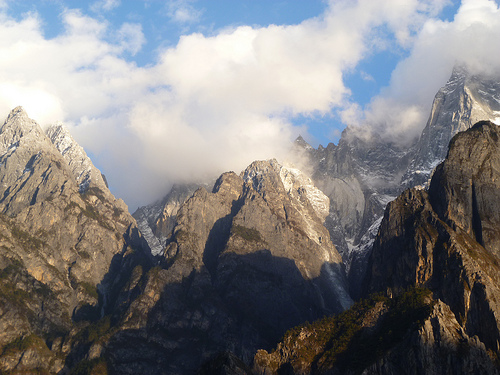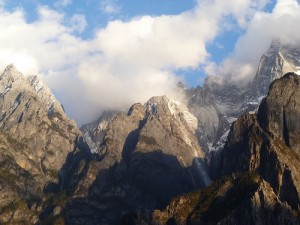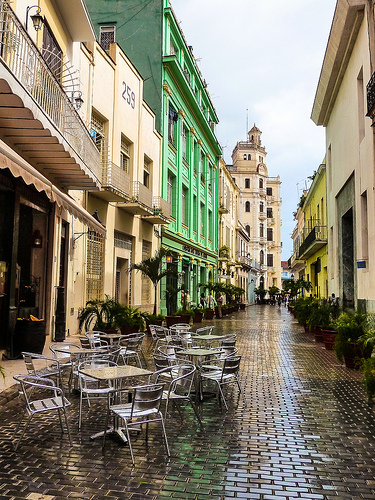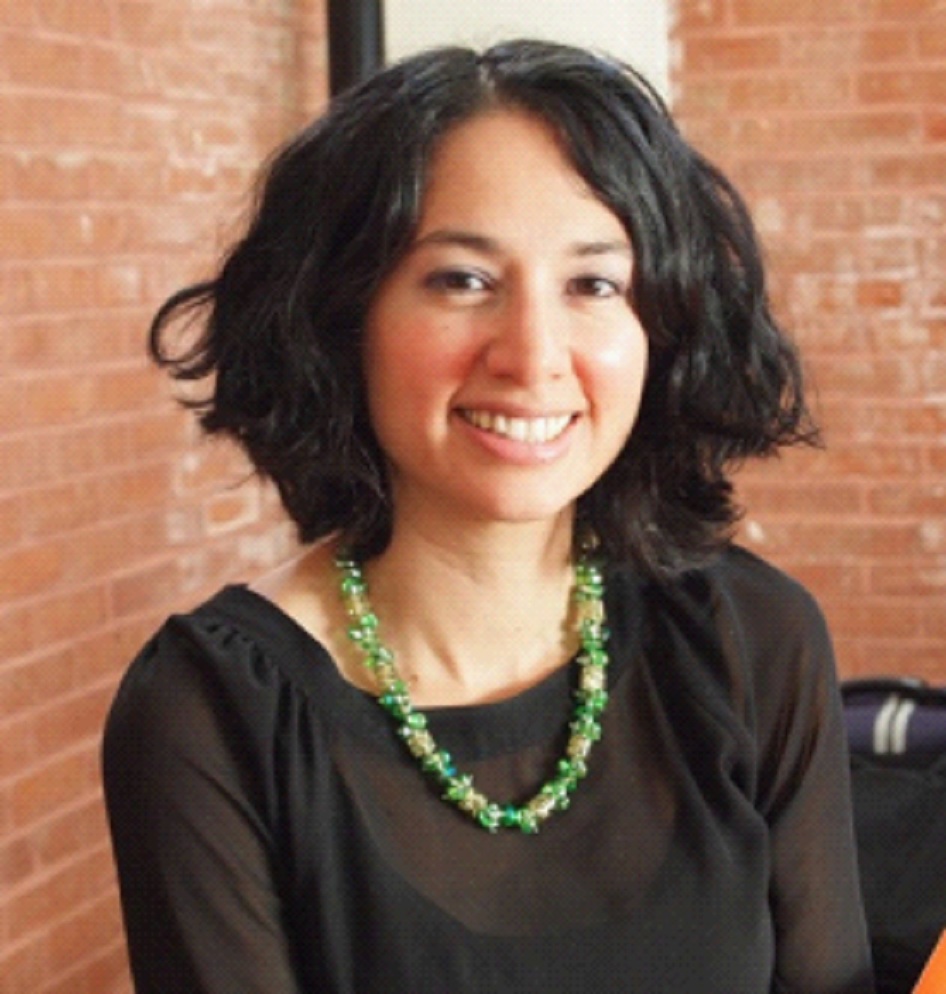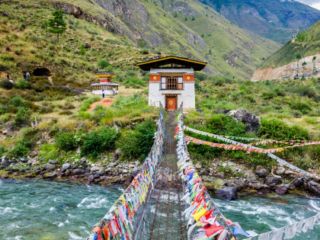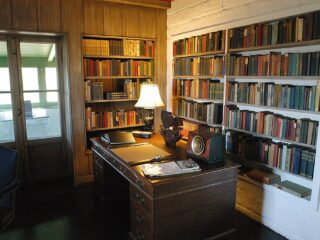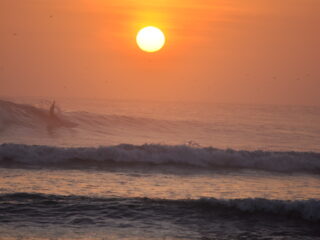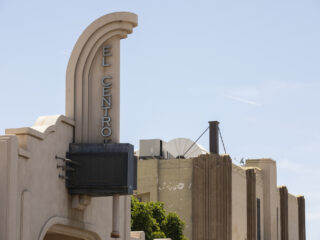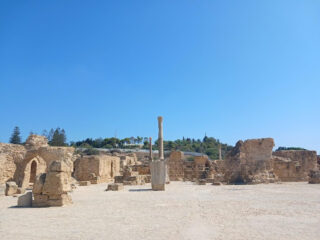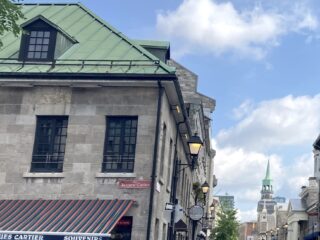The road ran unrelenting in front of me, straighter than it had any right to be in such mountainous country. Flanking the even stretch of tarmac were almost-finished apartment compounds. Their billboards offered the promise of community, yet the plazas and pathways were empty save for a few shabbily dressed security guards. Eventually, the buildings gave out and the valley floor stretched wide to the feet of the surrounding hills. Ahead of me, the Jade Dragon Snow Mountain loomed, its heights obscured by falling cloud.
On the surface of the narrow lanes leading away from the highway, the villagers were threshing; the steady stream of cars and bicycles which rode heedlessly over the crop threw up clouds of chaff in their wake.The lanes led me toward and then past a village; I kept circling around, never managing to access anything but dead-end side streets. Finally, I found my way to the village centre, from where it took only a few minutes to alight upon the small, conspicuous building which was my destination. A shallow stream ran, clear and cold, between the street and the row of houses and, as I dismounted my cycle and crossed to the other side, a lithe, middle-aged man emerged to greet me.
I was here in the village of Baisha, a few miles out from the city of Lijiang in the southwestern Chinese province of Yunnan, on the trail of the travel writer and novelist Bruce Chatwin, about whom I had spent the last six years writing. Chatwin’s visit to Yunnan in late 1985—and, more specifically, his subsequent journalistic reflections on the region—had unwittingly elevated a local healer and herbalist by the name of Dr Ho to unlikely international celebrity. I had journeyed here, on something of a whim, in order to meet the doctor, and to talk of the remarkable influence Bruce Chatwin had had on his life.
Chatwin’s 1985 trip marked his first and only encounter with China. Such relative unfamiliarity with the Middle Kingdom may appear surprising; reading his work and biography, one often feels he had an intimate knowledge of the whole world. Even now, more than twenty years after his death in 1989, Chatwin’s fame rests on his reputation as a travel writer, despite the fact that only two of his five full-length works—In Patagonia and The Songlines—can be even loosely described in this manner. Such is the impression leant to Chatwin’s canon by the restless and international life he lived.
He had put off his visit, he wrote, “for fear that the China of my imagination, a kind of ideal China composed of such congenial spirits as Li Po and Tu Fu did not exist.” Though his time in the country was brief—he quickly traveled on to Nepal—his Yunnan trip would help foster the impression that such a version of the Middle Kingdom had indeed been sustained.
Key to this impression was his encounter with Dr Ho. Chatwin arrived in Yunnan on the journalistic trail of Joseph Rock, the Austrian-born botanist who had ‘discovered’ this part of China and had made the country around it his home for nearly thirty years, until the communist victory of 1949 forced a swift departure. The published outcome of Chatwin’s search, however, eschewed anything more than a cursory discussion of Rock, concentrating instead upon his encounter with Dr Ho and his family.
“In China: Rock’s Kingdom”, published by the New York Times in 1986, recounts an afternoon spent with the doctor on the occasion of a feast held for his firstborn grandson. The profile, though unexceptional by the standards of his best work, is typical of Chatwin’s literary approach—honed by his days at the Sunday Times magazine—in its romantic, oblique presentation of a casually encountered individual:
From time to time, the Doctor himself appears at the head of the stairs, in a white clinician’s mobcap and silver-gray cotton greatcoat. He surveys the company with the amused, slightly otherworldly air of a Taoist gentleman-scholar, and flicks his wispy beard from side to side. As soon as the meal is over, he appears again, hypodermic in hand, as if to remind us that healing, even on this ‘Big Happy Day,’ is a work without end.
For Chatwin, the article constituted little more than a basic assignment accepted to cover the costs of his continuing travels in Asia. For Dr Ho and his family, however, the article and the doctor’s depiction within it as something of an Eastern sage—had a profound impact. Within a few years of the article’s publication, the doctor became listed as a local attraction by the fledging Western travel guides to the area; he is now a mainstay in the Yunnan chapters of such publications. The stream of international visitors to his clinic has swelled, to a now almost unmanageable number, with each passing year.
The man who emerged to greet me was the doctor’s son, Ho Shu-Long, and was also, he told me, a medical man. The clinic was of the traditional local style: mud brick, with window sashes and door frames of faded crimson. The tiled roof arched down toward its centre, bow and stern proud at either end. Inside, dusty glass-topped shop cabinets were filled with photographs and articles; the walls were likewise plastered with documents accounting the fame of the good doctor. Having told him my name and my reason for visiting, the doctor’s son walked me to the far wall of the clinic, from which hung four damp and slightly dog-eared copies of Bruce’s books, each sheathed by a protective zip-lock bag. We perused these silently for a few moments, before I was led on to a small table overlooking the Doctor’s garden and brought a pot of lukewarm herbal tea and some laminated reading material. The doctor was resting, I was told, but would be awake soon.
Chatwin had described this garden in his article.
Behind his surgery is a garden with paths of pebble-mosaic where a plum tree casts its shadow, like a sundial, on the whitewashed walls, and there are raised beds for growing medicinal herbs.
The plum tree was still there, but the rest of the garden was an overgrown tangle of weeds and bushes, from which poked abandoned plastic water barrels.
As I sat drinking my tea, I heard a rising swell of voices, and a troupe of Dutch tourists entered the dark clinic. The doctor’s son, recognising an audience worthy of his father’s rousing, disappeared upstairs, returning with the doctor himself. He looked all of his 89 years: his skin tight over his diminutive facial features, and his whiskers, familiar to me from Chatwin’s photos, now a pure white.
He quickly positioned himself upon a low stool at the centre of the waiting group, and began to hold forth in a manner that belied frequent repetition. The tourists were enthralled. He reflected on his rise to celebrity, and on his medical successes. He talked of the leukemia patient at the Mayo Clinic in the United States, cured of his disease by the doctor’s herbal prescriptions. He talked of those significant persons who had made the pilgrimage to his village—the list included ambassadors, writers, medical professors and television presenters. And, of course, he talked about Chatwin and his fateful visit to the clinic.
At the conclusion of his short speech, most of the Dutch, having checked off another guide book entry, drifted out into the street. A few middle-aged women lingered, hoping for a more profound encounter. The doctor, knowing his audience, humbly obliged. Taking them off individually to a small side room, he checked their pulse, looked at their tongue and asked various vague questions about their health, before folding a paper cone and filling it with a herbal tea mixture. All four women received the same prescription. Each also gave a donation: ‘For my work,’ the doctor said, taking the money.
As they left, the doctor drifted over to where I sat, and, clearly unaware that I had heard it once already, launched again into his speech. I attempted to interject, to convey my name, and the reason that I had come, but he continued oblivious for some minutes. Every time I mentioned Chatwin, he would smile and point to his collection of books, before continuing with his recitation. Eventually I managed to bring him to understanding, and he grew wistful. His eyes turned once more to the books. We talked, for a few minutes of Chatwin’s visit, and of the doctor’s life both before and after it, though little he told me deviated in either style or substance from the narrative I had seen earlier in his garden. He asked in conclusion, and I told, of the illness that Chatwin had succumbed to—AIDS. “Here, he looked so …. strong,” the doctor reflected.
The doctor then stood, requested that we have a photo taken together, and thanked me for my visit, asking me to send him a copy of anything I might decide to write about him (the doctor has a Google email account for such correspondence). He turned to begin a conversation with his son, and, assuming my audience was over, I wandered back out to the garden to collect my notebook and bag. I looked out from the verandah to the cloud-strewn Jade Dragon Snow Mountain. When Chatwin had taken his leave, he had contemplated the same scene, and had been drawn to compare the doctor to the Tang dynasty poet and wanderer Li Po. I was struggling to see that which Bruce had perceived. Chatwin had a well-documented ability to effect an alchemical transmutation in his writing of people and experiences; perhaps such was the case with his account of Dr Ho? Or perhaps the years—and the rise to fame—had effected their own change.
As I stood puzzling, the doctor’s son joined me on the verandah. Would I, he asked, like to visit the doctor’s house? Was this not the doctor’s house? I asked. No; the doctor and his family had indeed used to live here, but now it was merely employed as a clinic. The doctor had recently completed work on a new family home nearby, and had invited me to see it.
So we walked, the doctor’s son and I, along the main street, turning off down a narrow lane. Two stray dogs, startled by our appearance, raced ahead of us in the dust. The doctor’s house, as is typical in China, presented few discernible features to the street. A heavy, metal front door was unlocked and noisily opened, and we walked through a dimly-lit reception room, out into a large courtyard around which the building was oriented.
The house itself was of two shallow stories built of new timber, and the sickly smell of wood sap saturated the air. The quad was the verdant garden I had anticipated at the clinic; fulsome herbal specimens competed for space in the raised beds, whilst bees bumbled slowly in the still air.
Distracted as I was by this arcadian vision, it took me a moment to register the most dramatic feature of the house’s design. Below each of the many windows of the house, each itself intricately carved, was an individual wooden panel of around three feet square. There were perhaps twenty or so of these on each of the four aspects of the house and, on almost every individual panel, inscriptions pertaining to the doctor and his celebrity had been carved and painted, drawn from the various articles, books and television shows that had, over the years, referenced him. The dwelling, glorious though it was, essentially constituted an elaborate exercise in narcissism. The doctor’s son led me around the garden, occasionally pausing to read a particularly admiring quotation from the inscribed panels. He had carved the inscriptions himself, he told me; it had, unsurprisingly, been a labour of many months.
This astonishing project of self-regard continued inside the house. Ho Shu-Long led me from the courtyard into a dark room, which was decorated in the same manner as the clinic, though was perhaps twice the size. Lining the walls were more photos and articles concerning the doctor, letters from important persons, and attestations of the doctor’s medical successes. Ho Shu-Long presented each one in turn. The litany was endless. Eventually, I came to understand that the recitation would cease only at my own request, and I made the weak excuse that I needed to return to Lijiang for a meeting with friends.
As we strolled back to the clinic, I asked the doctor’s son what he thought of Chatwin, and the influence he had so obviously had on the doctor and his family. “It is good, I think. When my father was younger, he had very little. Life was difficult. Now we have much. We have this house, we have our clinic, and many visitors from around the world.”
I retrieved my bicycle from the tree outside the clinic where I had abandoned it, and began my slow return to Lijiang and its bustling heart.

